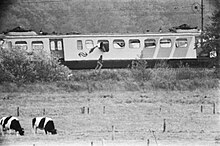Train hijacked De Punt
The train hijacking of De Punt was an act of violence by nine armed Moluccan terrorists in the Netherlands . It began on May 23, 1977 and took place near the town of De Punt near Glimmen on the border between the provinces of Groningen and Drenthe . The hostage-taking of the train occupants only ended after just under three weeks. Two hostages and six hostage takers were killed. At the same time, a nearby elementary school was stormed by Moluccan terrorists and the children and teachers were taken hostage.
prehistory
The Moluccas are a group of islands in eastern Indonesia between Sulawesi and New Guinea . During the Indonesian War of Independence , numerous Moluccas supported Dutch colonial rule . After the end of the war in 1949, they faced persecution as collaborators . In 1951 around 13,000 Moluccas emigrated to the Netherlands, with more to follow in the next few years. They were not welcome in their new homeland, there were no serious efforts to integrate, and some of them were housed in ghetto- like accommodations that developed into socially disadvantaged areas . The younger Moluccas became increasingly radicalized in view of the lack of prospects. Their goal was the establishment of an independent state of the South Moluccas . The first violent act was the occupation of the Indonesian embassy in Wassenaar in 1970 . On December 2, 1975, a regional train with around 50 passengers was hijacked near Wijster . In the days that followed, the train driver and two hostages were killed in this operation. The hostage situation lasted 13 days.
hostage taking
The second train hijacking by Moluccan terrorists, which occurred in the village of De Punt, was also a Mat '54 electric multiple unit . The four-part train was on its way from Rotterdam to Groningen . The nine armed hostage-takers moved on May 23, 1977 at 9:00 on the open road, the emergency brake . There were 50 travelers and the train crew on the train. In the village of Bovensmilde , a few kilometers away, four Moluccas stormed a primary school at the same time and took 105 children and five teachers hostage.
The hostage-takers demanded the release of their imprisoned like-minded people and support for their struggle for a state independent of Indonesia. They also asked for free travel and a plane to take them abroad with their released compatriots. For its part, the government made the release of all students a prerequisite for negotiations. To put pressure on the government, the kidnappers threatened to throw a hand grenade at a group of children over the next few days and they faked the execution of two train passengers. The government gambled on time to wear down terrorists' morale. The children, who also had intestinal infections, were gradually released. In the end only the four teachers were left in the school. There were also occasional releases on the train.
liberation
When the negotiations came to a standstill, the Dutch government decided to end both hostage-taking by force. After 20 days, on June 11, 1977 flew at 5:00 am first six fighter jets of the type Lockheed F-104 "Starfighter" just above the train to disorient to the kidnappers and to arrange for the hostages to lie down on the floor . Then the train was stormed by a special military unit. Two hostages and six Moluccan hostage-takers died and six people were injured. The hostage-taking in the elementary school came to a bloodless end on the same day.
consequences
The hostage-takers were later sentenced to between six and nine years in prison. The events prompted the Dutch government and the public to recognize the problems of the Moluccas and to endeavor to end the previously practiced exclusion of the ethnic minority. A joint commission was set up on the initiative of the Dutch Prime Minister Joop den Uyl . Although the commission disbanded in 1978, measures were taken to integrate the Moluccas. At the end of the 1970s, the "Molukkersnota" was adopted, a program to promote the Moluccas in the areas of education and work. For their part, the Moluccas in the Netherlands recognized that the demands for their own state are unrealistic and that they must actively seek integration. From today's perspective, the train hijacking of De Pont can be seen as the climax of the violent conflict.
See also
Individual evidence
- ^ Matthias Bertsch: A hostage drama and the shadows of colonial history . In: Deutschlandfunk . Retrieved February 3, 2019.
- ↑ Frederic Arntz: XIII. Train kidnappings and hostage-taking - violence escalated in the mid-1970s . In: WWU Münster - NetherlandsNet . September 2010. Retrieved February 3, 2019.
- ^ Josef Joffe: Holland: hostage dramas in the election campaign . In: Zeit Online . June 3, 1977. Retrieved February 10, 2019.
- ↑ Frederic Arntz: XV. A new beginning - reorientation and stagnating integration (1980-2009) . In: WWU Münster - NetherlandsNet . September 2010. Retrieved February 3, 2019.
Coordinates: 53 ° 7 ′ 7.3 " N , 6 ° 37 ′ 32.4" E

